This black tea comes from the crops in the Indian territory of Assam, where the precious buds of the Camellia assamica are collected and then processed to obtain a refined and high-quality tea. Assam black tea is known for its full-bodied and intense flavor, with soft malty tones and no bitter aftertaste. A sweet aroma, with slightly fruity and floral notes, hints of honey and malt. Suitable for enveloping the senses with one of the best Indian teas, soft. Its flavor is recognized as lively, strong and decisive even in this version without caffeine. Thanks to the attention paid during the decaffeination procedure, it is still possible to appreciate the qualities of this tea whenever you want, even in the evening. The dark leaves with golden tips, rare in a decaffeinated tea, create a delicious, strong and malty dark red Assam tea, decaffeinated just right, perfect at any time of the day!
What are the benefits of decaffeinated black tea?
One of the benefits of Assam tea with a reduced caffeine content is given by the possibility of enjoying the digestive and draining virtues, without risking the side effects of caffeine (theine). It avoids interfering with sleep, so it can also be sipped in the evening for those who are sensitive to caffeine. In addition, the decaffeination process of decaffeinated Assam tea does not remove L-theanine, the amino acid that relaxes and can help reduce mental stress. The benefits of Assam black tea concern the high content of polyphenols, which are maintained even with decaffeination. Catechins, flavonoids and tannins in this tea are plant-based chemicals that can help the body counteract cellular damage caused by free radicals and their pro-aging action.
Like other black teas, Assam also provides antioxidants that promote regular digestive and intestinal function. Tea polyphenols facilitate the growth and maintenance of healthy bacteria in the intestine (intestinal microbiota). Furthermore, this black tea is able to promote digestive well-being thanks to the presence of tannins with astringent properties.
It also has a diuretic effect, useful for eliminating excess fluids in the body, playing a supporting role in counteracting water retention and for purification. Furthermore, on a dietary level, black tea helps reduce appetite with its rounded and satisfying taste, which gives a feeling of satiety and sweetness.
The mineral salts contained in black tea are best released in this decaffeinated version, and make the infusion excellent for acquiring beneficial elements such as potassium, magnesium, iron, etc. In addition, the polyphenols in Assam tea can potentially also contribute to the well-being of the skin, maintaining skin elasticity in an anti-aging function.
Decteinated Assam tea is certainly one of the most appreciated for its antioxidant properties and low content of exciting alkaloids (caffeine and theophylline). To fully enjoy the benefits of this black tea, it is recommended to infuse it with loose leaves without adding milk or sugar.
Nutritional values of Assam decaffeinated black tea
This drink has a strong nutritional impact thanks to the content of antioxidant polyphenols (flavonoids, catechins, flavanols). It provides essential amino acids (including L-theanine), tannins, B vitamins and minerals such as magnesium, potassium, fluoride, calcium, zinc, phosphorus. It includes a small amount of caffeine (theine), theophylline and theobromine.
How to prepare Assam decaffeinated black tea
Insert about 3-5 grams of tea leaves into a cup (250 ml), in water at 90-95 °C. Leave to infuse for 3 to 5 minutes before drinking.
Want to try decaffeinated Assam black tea? Buy it in just a few clicks
Our shop specializing in the sale of tea online allows you to buy the leaves of this Assam black tea, without caffeine. You can find it in freshness-saving packs of 25 g, 50 g, 75 g, 100 g, 150 g, 300 g - suitable for keeping the product intact over time. The loose black tea version helps you calculate exactly the grams needed for your cup or teapot.
Origins of Assam black tea
This tea is obtained from the buds of the Camellia sinensis plant variety assamica, native to India. Camellia assamica differs from the sinensis sinensis variety, because it grows as a robust plant, and not a small shrub, reaching up to about 13 meters in height. The leaves of the Assam variety are robust, leathery and long (about 15 cm); suited to the hot-humid climate of this Indian territory, they are ideal for obtaining black teas such as Assam and Ceylon.
Assam black tea is grown in this north-eastern region of India, bordering Bangladesh and Myanmar, which reaches
This black tea comes from the crops in the Indian territory of Assam, where the precious buds of the Camellia assamica are collected and then processed to obtain a refined and high-quality tea. Assam black tea is known for its full-bodied and intense flavor, with soft malty tones and no bitter aftertaste. A sweet aroma, with slightly fruity and floral notes, hints of honey and malt. Suitable for enveloping the senses with one of the best Indian teas, soft. Its flavor is recognized as lively, strong and decisive even in this version without caffeine. Thanks to the attention paid during the decaffeination procedure, it is still possible to appreciate the qualities of this tea whenever you want, even in the evening. The dark leaves with golden tips, rare in a decaffeinated tea, create a delicious, strong and malty dark red Assam tea, decaffeinated just right, perfect at any time of the day!
What are the benefits of decaffeinated black tea?
One of the benefits of Assam tea with a reduced caffeine content is given by the possibility of enjoying the digestive and draining virtues, without risking the side effects of caffeine (theine). It avoids interfering with sleep, so it can also be sipped in the evening for those who are sensitive to caffeine. In addition, the decaffeination process of decaffeinated Assam tea does not remove L-theanine, the amino acid that relaxes and can help reduce mental stress. The benefits of Assam black tea concern the high content of polyphenols, which are maintained even with decaffeination. Catechins, flavonoids and tannins in this tea are plant-based chemicals that can help the body counteract cellular damage caused by free radicals and their pro-aging action.
Like other black teas, Assam also provides antioxidants that promote regular digestive and intestinal function. Tea polyphenols facilitate the growth and maintenance of healthy bacteria in the intestine (intestinal microbiota). Furthermore, this black tea is able to promote digestive well-being thanks to the presence of tannins with astringent properties.
It also has a diuretic effect, useful for eliminating excess fluids in the body, playing a supporting role in counteracting water retention and for purification. Furthermore, on a dietary level, black tea helps reduce appetite with its rounded and satisfying taste, which gives a feeling of satiety and sweetness.
The mineral salts contained in black tea are best released in this decaffeinated version, and make the infusion excellent for acquiring beneficial elements such as potassium, magnesium, iron, etc. In addition, the polyphenols in Assam tea can potentially also contribute to the well-being of the skin, maintaining skin elasticity in an anti-aging function.
Decteinated Assam tea is certainly one of the most appreciated for its antioxidant properties and low content of exciting alkaloids (caffeine and theophylline). To fully enjoy the benefits of this black tea, it is recommended to infuse it with loose leaves without adding milk or sugar.
Nutritional values of Assam decaffeinated black tea
This drink has a strong nutritional impact thanks to the content of antioxidant polyphenols (flavonoids, catechins, flavanols). It provides essential amino acids (including L-theanine), tannins, B vitamins and minerals such as magnesium, potassium, fluoride, calcium, zinc, phosphorus. It includes a small amount of caffeine (theine), theophylline and theobromine.
How to prepare Assam decaffeinated black tea
Insert about 3-5 grams of tea leaves into a cup (250 ml), in water at 90-95 °C. Leave to infuse for 3 to 5 minutes before drinking.
Want to try decaffeinated Assam black tea? Buy it in just a few clicks
Our shop specializing in the sale of tea online allows you to buy the leaves of this Assam black tea, without caffeine. You can find it in freshness-saving packs of 25 g, 50 g, 75 g, 100 g, 150 g, 300 g - suitable for keeping the product intact over time. The loose black tea version helps you calculate exactly the grams needed for your cup or teapot.
Origins of Assam black tea
This tea is obtained from the buds of the Camellia sinensis plant variety assamica, native to India. Camellia assamica differs from the sinensis sinensis variety, because it grows as a robust plant, and not a small shrub, reaching up to about 13 meters in height. The leaves of the Assam variety are robust, leathery and long (about 15 cm); suited to the hot-humid climate of this Indian territory, they are ideal for obtaining black teas such as Assam and Ceylon.
Assam black tea is grown in this north-eastern region of India, bordering Bangladesh and Myanmar, which reaches
This black tea comes from the crops in the Indian territory of Assam, where the precious buds of the Camellia assamica are collected and then processed to obtain a refined and high-quality tea. Assam black tea is known for its full-bodied and intense flavor, with soft malty tones and no bitter aftertaste. A sweet aroma, with slightly fruity and floral notes, hints of honey and malt. Suitable for enveloping the senses with one of the best Indian teas, soft. Its flavor is recognized as lively, strong and decisive even in this version without caffeine. Thanks to the attention paid during the decaffeination procedure, it is still possible to appreciate the qualities of this tea whenever you want, even in the evening. The dark leaves with golden tips, rare in a decaffeinated tea, create a delicious, strong and malty dark red Assam tea, decaffeinated just right, perfect at any time of the day!
What are the benefits of decaffeinated black tea?
One of the benefits of Assam tea with a reduced caffeine content is given by the possibility of enjoying the digestive and draining virtues, without risking the side effects of caffeine (theine). It avoids interfering with sleep, so it can also be sipped in the evening for those who are sensitive to caffeine. In addition, the decaffeination process of decaffeinated Assam tea does not remove L-theanine, the amino acid that relaxes and can help reduce mental stress. The benefits of Assam black tea concern the high content of polyphenols, which are maintained even with decaffeination. Catechins, flavonoids and tannins in this tea are plant-based chemicals that can help the body counteract cellular damage caused by free radicals and their pro-aging action.
Like other black teas, Assam also provides antioxidants that promote regular digestive and intestinal function. Tea polyphenols facilitate the growth and maintenance of healthy bacteria in the intestine (intestinal microbiota). Furthermore, this black tea is able to promote digestive well-being thanks to the presence of tannins with astringent properties.
It also has a diuretic effect, useful for eliminating excess fluids in the body, playing a supporting role in counteracting water retention and for purification. Furthermore, on a dietary level, black tea helps reduce appetite with its rounded and satisfying taste, which gives a feeling of satiety and sweetness.
The mineral salts contained in black tea are best released in this decaffeinated version, and make the infusion excellent for acquiring beneficial elements such as potassium, magnesium, iron, etc. In addition, the polyphenols in Assam tea can potentially also contribute to the well-being of the skin, maintaining skin elasticity in an anti-aging function.
Decteinated Assam tea is certainly one of the most appreciated for its antioxidant properties and low content of exciting alkaloids (caffeine and theophylline). To fully enjoy the benefits of this black tea, it is recommended to infuse it with loose leaves without adding milk or sugar.
Nutritional values of Assam decaffeinated black tea
This drink has a strong nutritional impact thanks to the content of antioxidant polyphenols (flavonoids, catechins, flavanols). It provides essential amino acids (including L-theanine), tannins, B vitamins and minerals such as magnesium, potassium, fluoride, calcium, zinc, phosphorus. It includes a small amount of caffeine (theine), theophylline and theobromine.
How to prepare Assam decaffeinated black tea
Insert about 3-5 grams of tea leaves into a cup (250 ml), in water at 90-95 °C. Leave to infuse for 3 to 5 minutes before drinking.
Want to try decaffeinated Assam black tea? Buy it in just a few clicks
Our shop specializing in the sale of tea online allows you to buy the leaves of this Assam black tea, without caffeine. You can find it in freshness-saving packs of 25 g, 50 g, 75 g, 100 g, 150 g, 300 g - suitable for keeping the product intact over time. The loose black tea version helps you calculate exactly the grams needed for your cup or teapot.
Origins of Assam black tea
This tea is obtained from the buds of the Camellia sinensis plant variety assamica, native to India. Camellia assamica differs from the sinensis sinensis variety, because it grows as a robust plant, and not a small shrub, reaching up to about 13 meters in height. The leaves of the Assam variety are robust, leathery and long (about 15 cm); suited to the hot-humid climate of this Indian territory, they are ideal for obtaining black teas such as Assam and Ceylon.
Assam black tea is grown in this north-eastern region of India, bordering Bangladesh and Myanmar, which reaches
This black tea comes from the crops in the Indian territory of Assam, where the precious buds of the Camellia assamica are collected and then processed to obtain a refined and high-quality tea. Assam black tea is known for its full-bodied and intense flavor, with soft malty tones and no bitter aftertaste. A sweet aroma, with slightly fruity and floral notes, hints of honey and malt. Suitable for enveloping the senses with one of the best Indian teas, soft. Its flavor is recognized as lively, strong and decisive even in this version without caffeine. Thanks to the attention paid during the decaffeination procedure, it is still possible to appreciate the qualities of this tea whenever you want, even in the evening. The dark leaves with golden tips, rare in a decaffeinated tea, create a delicious, strong and malty dark red Assam tea, decaffeinated just right, perfect at any time of the day!
What are the benefits of decaffeinated black tea?
One of the benefits of Assam tea with a reduced caffeine content is given by the possibility of enjoying the digestive and draining virtues, without risking the side effects of caffeine (theine). It avoids interfering with sleep, so it can also be sipped in the evening for those who are sensitive to caffeine. In addition, the decaffeination process of decaffeinated Assam tea does not remove L-theanine, the amino acid that relaxes and can help reduce mental stress. The benefits of Assam black tea concern the high content of polyphenols, which are maintained even with decaffeination. Catechins, flavonoids and tannins in this tea are plant-based chemicals that can help the body counteract cellular damage caused by free radicals and their pro-aging action.
Like other black teas, Assam also provides antioxidants that promote regular digestive and intestinal function. Tea polyphenols facilitate the growth and maintenance of healthy bacteria in the intestine (intestinal microbiota). Furthermore, this black tea is able to promote digestive well-being thanks to the presence of tannins with astringent properties.
It also has a diuretic effect, useful for eliminating excess fluids in the body, playing a supporting role in counteracting water retention and for purification. Furthermore, on a dietary level, black tea helps reduce appetite with its rounded and satisfying taste, which gives a feeling of satiety and sweetness.
The mineral salts contained in black tea are best released in this decaffeinated version, and make the infusion excellent for acquiring beneficial elements such as potassium, magnesium, iron, etc. In addition, the polyphenols in Assam tea can potentially also contribute to the well-being of the skin, maintaining skin elasticity in an anti-aging function.
Decteinated Assam tea is certainly one of the most appreciated for its antioxidant properties and low content of exciting alkaloids (caffeine and theophylline). To fully enjoy the benefits of this black tea, it is recommended to infuse it with loose leaves without adding milk or sugar.
Nutritional values of Assam decaffeinated black tea
This drink has a strong nutritional impact thanks to the content of antioxidant polyphenols (flavonoids, catechins, flavanols). It provides essential amino acids (including L-theanine), tannins, B vitamins and minerals such as magnesium, potassium, fluoride, calcium, zinc, phosphorus. It includes a small amount of caffeine (theine), theophylline and theobromine.
How to prepare Assam decaffeinated black tea
Insert about 3-5 grams of tea leaves into a cup (250 ml), in water at 90-95 °C. Leave to infuse for 3 to 5 minutes before drinking.
Want to try decaffeinated Assam black tea? Buy it in just a few clicks
Our shop specializing in the sale of tea online allows you to buy the leaves of this Assam black tea, without caffeine. You can find it in freshness-saving packs of 25 g, 50 g, 75 g, 100 g, 150 g, 300 g - suitable for keeping the product intact over time. The loose black tea version helps you calculate exactly the grams needed for your cup or teapot.
Origins of Assam black tea
This tea is obtained from the buds of the Camellia sinensis plant variety assamica, native to India. Camellia assamica differs from the sinensis sinensis variety, because it grows as a robust plant, and not a small shrub, reaching up to about 13 meters in height. The leaves of the Assam variety are robust, leathery and long (about 15 cm); suited to the hot-humid climate of this Indian territory, they are ideal for obtaining black teas such as Assam and Ceylon.
Assam black tea is grown in this north-eastern region of India, bordering Bangladesh and Myanmar, which reachesto the Bay of Bengal. Assam is the world's largest tea-growing area. The plants are grown in approximately 2,000 "tea gardens" at sea level, and they produce nearly 450,000 tons of tea each year (about 55% of India's total annual production). This region is characterized by an area rich in forests and open rolling plains, through which the Brahmaputra River flows. In this Brahmaputra Valley, the fertile soil of these agricultural plains comes from the organic materials transported by the river, which rises in the mountains of Tibet. In addition to the soil, the growth of the tea plants is also helped by the rain, with high precipitation, so much so that it creates a very humid environment, a vast natural greenhouse. This is where the best teas ever grow, with a malty flavor, also called "women's tea" because 80% of the harvesting and processing of Assam is carried out by women.
Like all black teas, Assam also undergoes a particular process, namely the complete oxidation of its leaves, after harvesting. This is a chemical oxidation process that makes the leaves darker, develops an intense flavor and a robust aroma; in the case of Assam black tea, it gives it a dark red color.
What does decaffeinated tea mean?
In addition to oxidation processes, decaffeinated black tea is subjected to the decaffeination process, to deprive it of most of the caffeine (theine). You can talk about decaffeinated or decaffeinated tea as synonyms, since caffeine is called theine when it is found in tea, but it is essentially the same molecule.
TGFOP black tea, what does it mean?
The acronym literally means Tippy Golden Flowery Orange Pekoe – that is, formed by the golden tips (buds) in the tea, consisting of the new shoot accompanied by two leaves. It is classified according to the word Pekoe, which probably derives from the Chinese pek-ho and refers to the silver hairs on the leaves of some types of tea plants. Orange (orange) is perhaps the symbol of the Dutch house of Orange-Nassau, and was used by the Dutch East India Company to classify and sell the tea brought to Europe. The buds used for the production of this Assam TGFOP black tea represent the precious part of the tea plant. These delicate young leaves and the tips of the plant usually contain higher concentrations of aromatic oils than the more mature leaves. In the production of these black teas, sometimes only the tip or upper bud is used, other times one or two leaves are included.

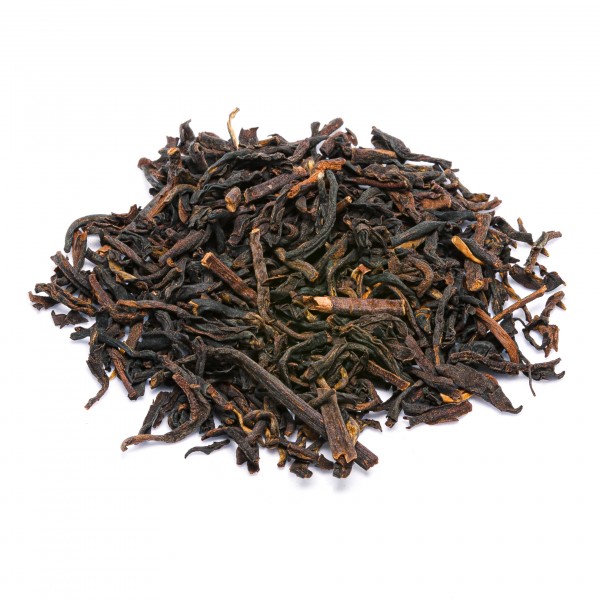









 No reward points for this product.
No reward points for this product.
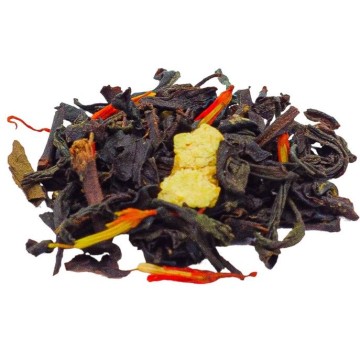
![black tea Irish Rum [Natura d'Oriente]](https://www.naturadoriente.com/3388-home_default/black-tea-irish-rum-.jpg)
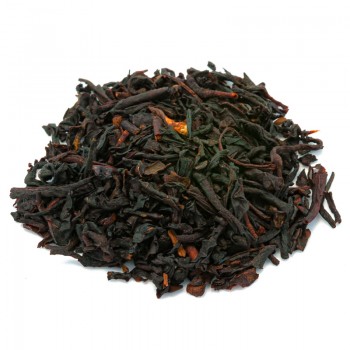

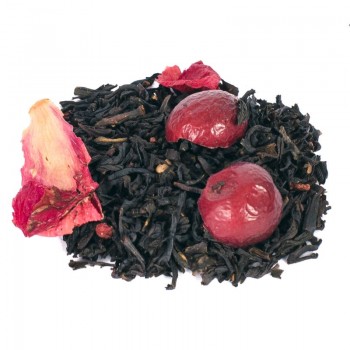
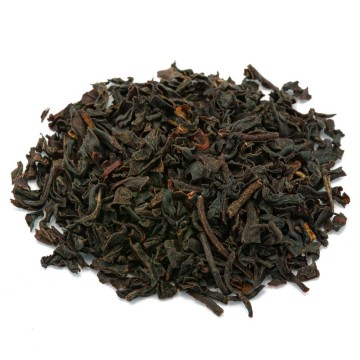
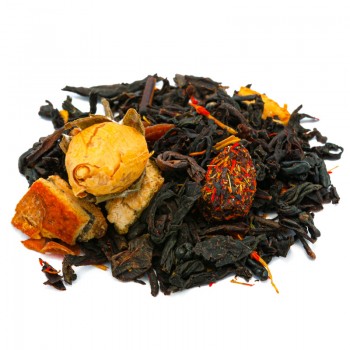
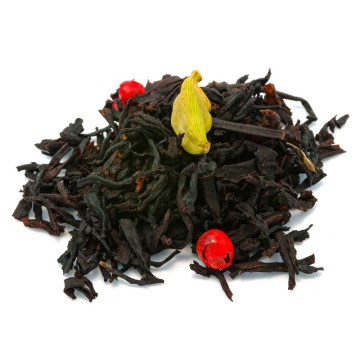
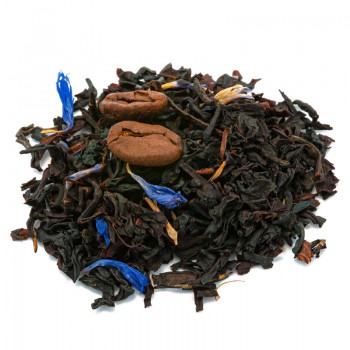
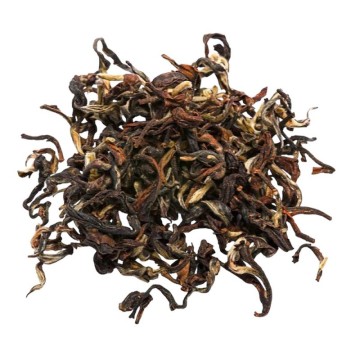
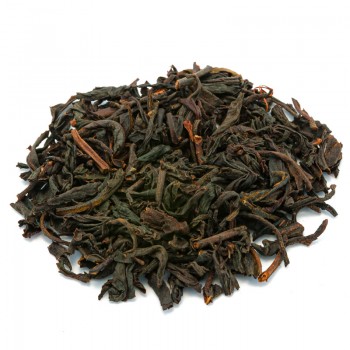
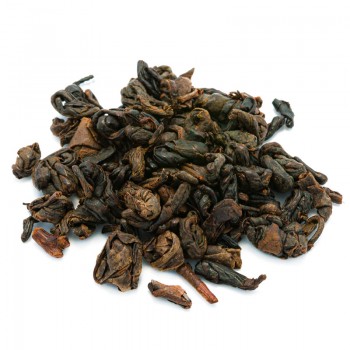
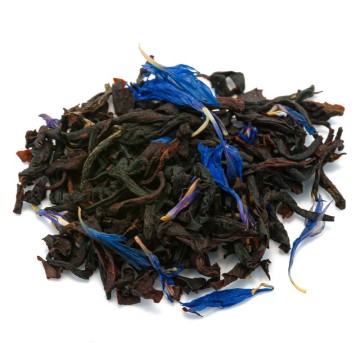
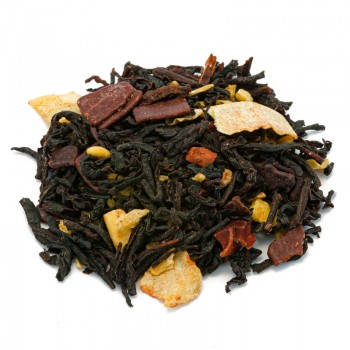
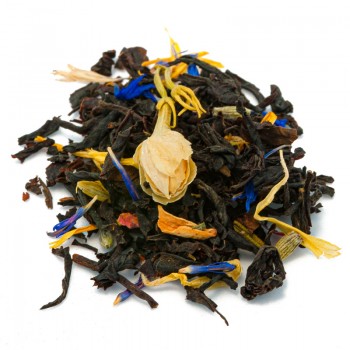
![Black tea Honey Black Formosa [Natura d'Oriente]](https://www.naturadoriente.com/3390-home_default/black-tea-honey-black-formosa-.jpg)